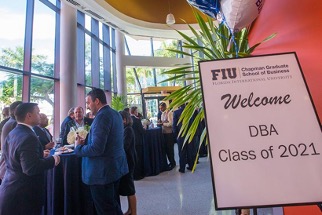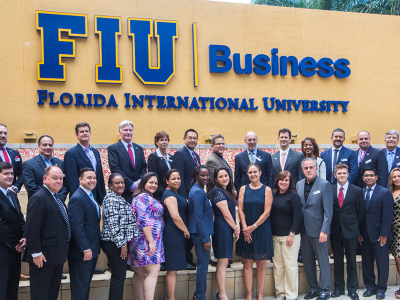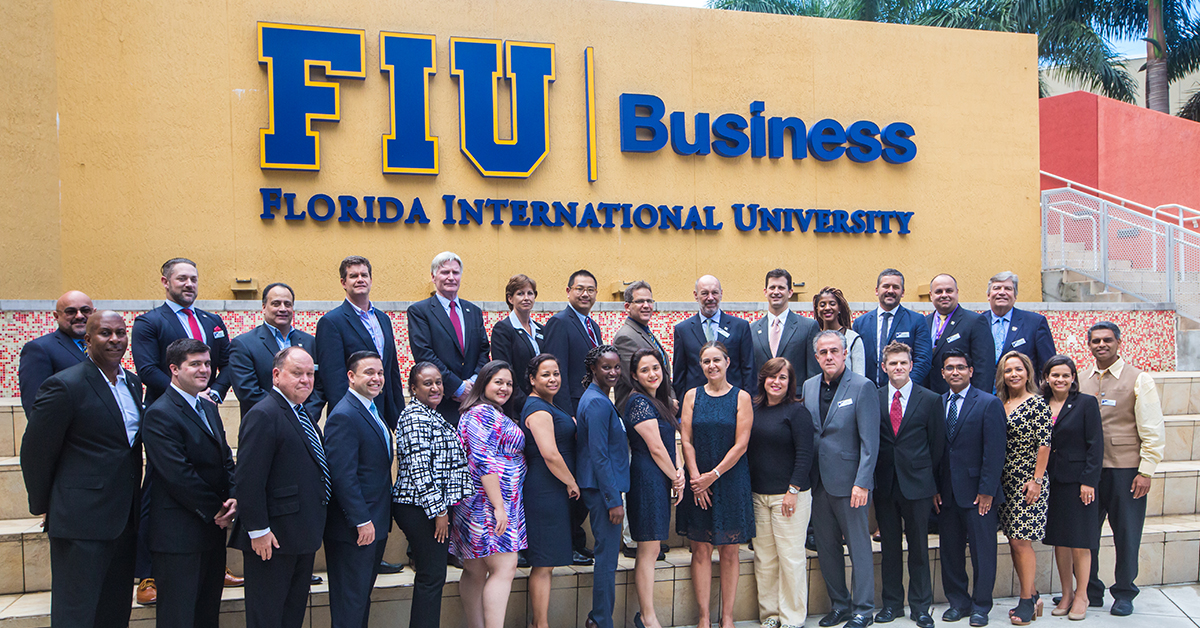I began my DBA journey at FIU with a burning question and a problem to solve. However, I quickly realized that my problem was not really THE problem, and my question was not even really a question.
"Welcome to the DBA program. In just three years, you will all be thinking like a scholar, speaking like a scholar, and will be a scholar. You will become a subject matter expert in your domain. It will be rigorous, and you will get there… BUT you will have to trust the process."
- George Marakas
This is how our program director, George Marakas, welcomed us on the first day of the program. After receiving all of the program material, we were quickly introduced to our cohort "family," and I began my journey. As I began to read our first assignments, I realized that I did not understand much of what I was reading - literally. While it was in plain English, it seemed like a foreign language to me. I anxiously prepared for my first class, concerned about whether I would be able to hold my own with my peers. I kept hearing that voice… "trust the process."

One of the greatest benefits of the program was my fellow cohort members. I was not alone in this adventure. Coming from a variety of backgrounds and professions, they expanded my network outside of my day-to-day colleagues. Additionally, this stimulated the discussions in class with varied perspectives as they were all curious in their quest for knowledge. After that first class, I realized that we would be facing the same challenges, and eventually, relationships would develop that would continue well after graduation. Ultimately, the cohort would serve as my support system throughout the program.
Yet, they were not the only ones who provided much-needed support. A world-class faculty is there to serve as an essential resource. While they are there to challenge and push you intellectually (which they did), they also will work with you to ensure that you grow and develop into a scholar. As a result, I quickly developed relationships with many of the faculty in the program. Whenever I had a question or if I needed clarification about an assignment or project, I could call on them. I found that the faculty are truly expert guides in their respective domains, and they are there to help you succeed.

Even with a strong support system in tow, my journey towards the DBA was not without its challenges. As I mentioned, learning a new "language" to become a scholar was not going to be easy. Yes, you want to get to your dissertation on day one. However, I had to go through the process of getting there. At first, you start with the basics. You learn how to conduct social science research, develop a "so what?" to support your identified problem, and quantify the findings of said research.
As part of this, one of the primary tasks was to develop a research question. Sounds simple enough … however, this is not just developing any question; this is a question that must be researchable. After spending a whole year (yes, a whole year) to develop my question, I learned that forming a question that means something and tries to solve a workplace problem is an elusive effort.
In that same year, I also began identifying a problem I wanted to solve as part of my research. It turns out the problem I thought I wanted to solve was not a problem at all. Here, I found that many times at work, we tend to focus on symptoms of a problem and fail to address the more significant issue. These key takeaways would set the tone for the rest of my DBA experience.
With year one in the books, I had a research question and problem in hand. However, that first summer, I was tasked with conducting my first research project to answer my question. I went through the entire process from the institutional review board applications to data collection and analysis. Here is where I learned that being a researcher is simply not an easy task. There are challenges with developing a quality measuring tool, collecting sufficient data, and making sense of it. During the project, there were days that I questioned my abilities to be able to finish it. Again, I heard that voice … "trust the process." I was able to push through and finish my first research project as part of the program. What a relief!
Starting year two, I felt a bit more at ease with what was ahead. I had become familiar with the basics of understanding research methodologies and studies. I felt a sense of accomplishment in that I made it through my first research project. Yet, this was a year in which we had to learn an entirely new way to conduct research. What we learned in year one was just the tip of the iceberg. This new year is where we transitioned to becoming a complete scholar, one who could quantify solutions to problems and describe them through observation.
Throughout the second year, I had to develop a new way of asking my research question, learn how to observe a phenomenon, conduct interviews, and transcribe them to propose an answer to my question. I realized that this approach not only provided insights to a specific business problem I wanted to solve; it also added depth and richness to possible solutions that went beyond just numbers. It was another tool provided to us through the program to use as practitioner-scholars. We were now fully equipped to tackle the problem we set out to solve when we started.
Or so I thought.
Year two also took me through a process to precisely identify whether the problem I started with is really a problem or merely a symptom of a bigger problem. It also needed to have a measurable solution. During this process, I learned how to develop a consultant's proposal and conduct a needs assessment to identify organizational needs to find and address problems. This added skill was beneficial in further developing my research and the "so what" behind it. It also provided insights on other potential avenues in which your research toolbox can extend beyond academia and into managerial consulting.

Another aspect of becoming a practitioner-scholar through the DBA program is developing the potential to share and ultimately publish your research. Through the second year, I learned to fine-tune this skill through multiple presentations and performing collaborative research with my cohort peers. I also learned to expand my opportunities not only locally but internationally. Through coursework in international business, corporate policy, organizational leadership and marketing, I not only was exposed to the theory behind these subjects but learned how to apply it to further my own research.
While year one set the stage for my development into a scholar, year two added the engagement and evolutionary element of becoming a practitioner AND a scholar. As year two ended, then came the announcement, "I need your dissertation proposals as soon as possible," said Dr. Marakas. Everyone looked at each other, wondering if anyone in the room was ready. However, we all were and just did not know it yet. He knew, though.
Heading into year three, I began developing my proposal for the first round of comments. Much of this refinement was based on work previously done throughout the first two years of the program. Little did I know that we began the dissertation process with Dr. Marakas on day one. The program was designed to be this way. I obtained the tools to assemble the drafts needed to prepare me for my dissertation proposal and its defense along the way. After several iterations of my dissertation proposal, I was able to defend it successfully. The outcome was that half of my dissertation was already completed as I began the final year. The faculty and my cohort were supporting me every step of the way.
The final year of the program had me focused on one task, a finished dissertation. With my assigned committee chair, we worked together to refine my study further. At the same time, the opportunities of becoming a doctoral candidate began to emerge. I had the chance to attend academic conferences to present and obtain feedback on my research. It led to many networking opportunities, both nationally and internationally, that opened doors to share my research further and collaborate with others on future projects. With this experience in hand, I was getting closer to the finish line.
"As my DBA journey reached its conclusion, I reflected on who I was then and who I am now. Was it easy? No!
Was it worth it? Absolutely!"- Tony Lopez
The program doesn't just grant you a degree or a title; it changes who you are and how you think about the world around you. There are many business problems out there to solve, and you leave much better equipped to solve them. I arrived as a practitioner and am leaving as an engaged practitioner-scholar embarking on a brand new journey full of opportunities.
To get there, all I had to do was "trust the process."


